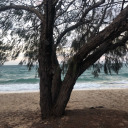Running-with-bad-skeleton-hats

More Posts from Running-with-bad-skeleton-hats and Others
“It is terrifying to think that one day you will trust somebody enough to let them see you naked. You will undress and remind them that you’ve stretch marks and birth marks and scars from having chicken pox when you were little and scars from all of the other things now. You will blush thousands of shades of red, painting yourself as a rose losing its petals. And that person - that person will take it all in. And I wonder if they will reassure you. But mostly, I wonder if they will even see anything worth reassuring you about. I hope they see each freckle on your back as if it’s a star and you are the whole universe to them.”
— K.P.K (via ohteenscanrelate)


“Memories warm you up from the inside. But they also tear you apart.”
— Haruki Murakami, Kafka on the Shore (via thegoodvybe)


![Check Out Our Landscape Blog - Https://ift.tt/2sGLyRv Beaver Falls, Havasupai, AZ [3024x4032] (oc) Via](https://64.media.tumblr.com/de258d4f0df09908b5684cb2d0fada21/856e0e332fa21d95-b5/s500x750/a47d9b460212f2eb5b86b4d5b9844a9f3a4624af.jpg)
Check out our landscape blog - https://ift.tt/2sGLyRv Beaver Falls, Havasupai, AZ [3024x4032] (oc) via /r/EarthPorn https://ift.tt/2sDrcMY
What if I told y’all the earth was a skinny legend and her waist was snatched to the gods. Then would y’all finally stan her and do more to fight global warming??? 🤔🤔🤔











Where Children Sleep photographed by James Mollison around the world.
"When photographer James Mollison was asked to do a project on children’s rights, he found himself thinking back to his childhood bedroom and the deep importance it played in his upbringing. Taking that idea with him around the world, he photographed a diverse cross section of children and the bedrooms they call home. His moving images remove the children from their home environment, showing them before a neutral background that mostly hides their economic status as if to say “kids are just kids.” Only when their bedroom is observed, however, does the full scope of their living situation become poiniently clear.”
Water, Water Everywhere; We Track Drops to Drink!
When we think about what makes a planet habitable, we’re often talking about water. With abundant water in liquid, gas (vapor) and solid (ice) form, Earth is a highly unusual planet. Almost 70% of our home planet’s surface is covered in water!

But about 97% of Earth’s water is salty – only a tiny amount is freshwater: the stuff humans, pets and plants need to survive.
Water on our planet is constantly moving, and not just geographically. Water shifts phases from ice to water to vapor and back, moving through the planet’s soils and skies as it goes.
That’s where our satellites come in.

Look at the Midwestern U.S. this spring, for example. Torrential rain oversaturated the soil and overflowed rivers, which caused severe flooding, seen by Landsat.

Our satellites also tracked a years-long drought in California. Between 2013 and 2014, much of the state turned brown, without visible green.

It’s not just rain. Where and when snow falls – and melts – is changing, too. The snow that falls and accumulates on the ground is called snowpack, which eventually melts and feeds rivers used for drinking water and crop irrigation. When the snow doesn’t fall, or melts too early, communities go without water and crops don’t get watered at the right time.

Even when water is available, it can become contaminated by blooms of phytoplankton, like cyanobacteria . Also known as blue-green algae, these organisms can make humans sick if they drink the water. Satellites can help track algae from space, looking for the brightly colored blooms against blue water.


Zooming even farther back, Earth’s blue water is visible from thousands of miles away. The water around us makes our planet habitable and makes our planet shine blue among the darkness of space.

Knowing where the water is, and where it’s going, helps people make better decisions about how to manage it. Earth’s climate is changing rapidly, and freshwater is moving as a result. Some places are getting drier and some are getting much, much wetter. By predicting droughts and floods and tracking blooms of algae, our view of freshwater around the globe helps people manage their water.
Make sure to follow us on Tumblr for your regular dose of space: http://nasa.tumblr.com.
-
 mmmudlark reblogged this · 4 years ago
mmmudlark reblogged this · 4 years ago -
 pomskypuppy reblogged this · 5 years ago
pomskypuppy reblogged this · 5 years ago -
 theduckislord reblogged this · 5 years ago
theduckislord reblogged this · 5 years ago -
 theduckislord liked this · 5 years ago
theduckislord liked this · 5 years ago -
 barefootintexas liked this · 5 years ago
barefootintexas liked this · 5 years ago -
 rockingbrooklyn liked this · 5 years ago
rockingbrooklyn liked this · 5 years ago -
 am-i-invisible777 reblogged this · 5 years ago
am-i-invisible777 reblogged this · 5 years ago -
 elenaye25 liked this · 5 years ago
elenaye25 liked this · 5 years ago -
 skullmansmate liked this · 5 years ago
skullmansmate liked this · 5 years ago -
 nemoangryalien reblogged this · 5 years ago
nemoangryalien reblogged this · 5 years ago -
 madnessx-xreturns liked this · 5 years ago
madnessx-xreturns liked this · 5 years ago -
 of-void-and-stars reblogged this · 5 years ago
of-void-and-stars reblogged this · 5 years ago -
 of-void-and-stars liked this · 5 years ago
of-void-and-stars liked this · 5 years ago -
 caramelzebra liked this · 5 years ago
caramelzebra liked this · 5 years ago -
 waistcoat35 liked this · 5 years ago
waistcoat35 liked this · 5 years ago -
 loveshouldnthurtlikethat liked this · 5 years ago
loveshouldnthurtlikethat liked this · 5 years ago -
 medoedelirioworld liked this · 5 years ago
medoedelirioworld liked this · 5 years ago -
 blacker-shade-of-darkk reblogged this · 5 years ago
blacker-shade-of-darkk reblogged this · 5 years ago -
 haniela liked this · 5 years ago
haniela liked this · 5 years ago -
 maoist-mizer liked this · 5 years ago
maoist-mizer liked this · 5 years ago -
 oshitwaddup13 liked this · 5 years ago
oshitwaddup13 liked this · 5 years ago -
 caprasings liked this · 5 years ago
caprasings liked this · 5 years ago -
 sussycat500 liked this · 5 years ago
sussycat500 liked this · 5 years ago -
 jailor reblogged this · 5 years ago
jailor reblogged this · 5 years ago -
 nonstoplive liked this · 5 years ago
nonstoplive liked this · 5 years ago -
 stopmulder liked this · 5 years ago
stopmulder liked this · 5 years ago -
 feralcrypt reblogged this · 5 years ago
feralcrypt reblogged this · 5 years ago -
 feralcrypt liked this · 5 years ago
feralcrypt liked this · 5 years ago -
 brount reblogged this · 5 years ago
brount reblogged this · 5 years ago -
 balladoftherockatiel reblogged this · 5 years ago
balladoftherockatiel reblogged this · 5 years ago -
 sanherib reblogged this · 5 years ago
sanherib reblogged this · 5 years ago -
 kattdrottningen reblogged this · 5 years ago
kattdrottningen reblogged this · 5 years ago -
 imgonnaeataburgersometime reblogged this · 5 years ago
imgonnaeataburgersometime reblogged this · 5 years ago -
 imgonnaeataburgersometime liked this · 5 years ago
imgonnaeataburgersometime liked this · 5 years ago -
 mustachesandquotes reblogged this · 5 years ago
mustachesandquotes reblogged this · 5 years ago -
 mustachesandquotes liked this · 5 years ago
mustachesandquotes liked this · 5 years ago -
 brodudepants reblogged this · 5 years ago
brodudepants reblogged this · 5 years ago -
 buymebread reblogged this · 5 years ago
buymebread reblogged this · 5 years ago -
 shadesofhappy reblogged this · 5 years ago
shadesofhappy reblogged this · 5 years ago -
 ourherosatan reblogged this · 5 years ago
ourherosatan reblogged this · 5 years ago
